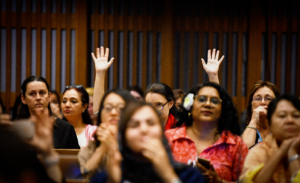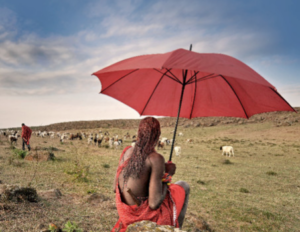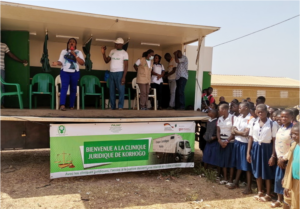What Does Climate Justice Mean for Youth and Women Right’s Organisations in Africa, Middle East and Latin America? (Part 2)
continuation of part 1 of this blog
5. (Advocacy for) Participation in the Formulation and Implementation of Women and Youth-Related International and Regional Policy Processes
 The great number of international and regional agreements, policies, and negotiations strongly affecting climate justice concerns at the national level need to ensure the participation of women and youth to reflect their specific concerns. To ensure that these supra-national policy processes are ‘ground-truthed’ and based on real-world contexts and living conditions of women and youth, local and subnational organizations and initiatives should build the backbone of such processes. Hence, the underlying procedures are vital to be scrutinized in view of more gender-and youth-sensitive versions of climate justice. As a consequence, new international alliances among disparate actors and social movements will be required. Alliances between those that share common climate challenges need support with a focus on case studies of effective climate justice campaigns aimed at identifying key enabling conditions and assessing the extent to which they might be replicable or transferable to other contexts.
The great number of international and regional agreements, policies, and negotiations strongly affecting climate justice concerns at the national level need to ensure the participation of women and youth to reflect their specific concerns. To ensure that these supra-national policy processes are ‘ground-truthed’ and based on real-world contexts and living conditions of women and youth, local and subnational organizations and initiatives should build the backbone of such processes. Hence, the underlying procedures are vital to be scrutinized in view of more gender-and youth-sensitive versions of climate justice. As a consequence, new international alliances among disparate actors and social movements will be required. Alliances between those that share common climate challenges need support with a focus on case studies of effective climate justice campaigns aimed at identifying key enabling conditions and assessing the extent to which they might be replicable or transferable to other contexts.
There are strong traditions of indigenous activism in Latin America and tribal activism in India and parts of Africa. These traditions highlight the important role of environmental defenders all over the world. Climate justice concerns can form the groundwork for broader cross-cutting social mobilisations, leaving behind regional, class, race and gender divides. Support for this kind of activism through engagement activities, facilitation, research, and toolkits for advocacy and legal activism, among other ways, needs to be enhanced.
6.Public Participation and Inclusion of Women and Youth Groups at National Level Policy and Decision-Making Processes Relating to Climate Justice
Until now, relatively little focus has been given to climate justice within countries. Decision-making processes at the national and sub-national levels have proven vulnerable to capture and abuse by stronger political and economic actors. There have been too many cases of tokenistic processes of ‘participation’ in decision-making that regard the access to or use of land and natural resources. Exclusions continue to occur, risking the further alienation of already marginalised communities, indigenous peoples and social groups, foremost women. Hence, sub-national processes of decision-making and governance should be a key focus of climate justice activities.
One of the most relevant ways in which local and indigenous voices have been included in these decision-making processes is through their participation in free, prior, and informed consent (FPIC) procedures. However, there are several procedural issues and shortcomings around FPIC that affect climate resilience and adaptation projects. Documented cases show that lack of consultation with host communities, poor dissemination of information about projects and meetings are widespread. Women and youth organisations should insist on new project development practices to demonstrate public engagement has taken place. A wide variety of recent stakeholder consultation toolkits already integrates these practices, for instance, from Transparency International and Carbon Market Watch (Carbon Market Watch 2018), or the Forest Peoples Programme.
7. Recognition of Pluralism and Integration of Diverse Domains of Knowledge – Rights to Access Information and Data
 In addition to a generally disproportionate generation of accessible and recognised knowledge between the Global North and South, there are also procedural justice issues around climate change knowledge production. Through the centrality of expert knowledge, the creation of ‘rosters of experts’ or the reliance on consultants, based and educated in the Global North, a privileged and powerful position is manifested in climate-related decision-making.
In addition to a generally disproportionate generation of accessible and recognised knowledge between the Global North and South, there are also procedural justice issues around climate change knowledge production. Through the centrality of expert knowledge, the creation of ‘rosters of experts’ or the reliance on consultants, based and educated in the Global North, a privileged and powerful position is manifested in climate-related decision-making.
This phenomenon continues to be reproduced, despite the attention given to equity and other justice issues. The discursive power concentrated around a few organisations has profound implications for the generation of knowledge about climate issues. It raises concerns of ‘cognitive justice’ in the sense of whose knowledge counts: who participates in agenda-setting and to whom are the creators and disseminators of knowledge accountable for the effects of their knowledge. The Humanitarian Environment Charter embraces the potential to learn from local, traditional and indigenous knowledge, while highlighting that action should be guided by the experience of local actors (see Article 3; ICRC/ IFRC, 2021). It calls to “better integrate community-level analysis of risks and vulnerability with scientific research and data”.
Decision-making on climate adaptation or clean energy needs to ensure the rights of all persons to have access to information in a timely and appropriate manner. This information also includes judicial and administrative proceedings. The digitalization of data and information carries both, potentially the chance of improved and enhanced access, but also potential negligence of non-digital/ digitized types of knowledge. A key backbone of climate justice is therefore the co-existence and co-evolution of knowledge systems rather than the dominance of only one view. Given the relevance of nature-based solutions (NbS) in the fight against the impacts of climate change, this should gain more attention. NbS are traditionally more focused on local knowledge of functions and characteristics of local ecosystems and hence, by promoting NbS specific elements of climate justice are inherently integrated.
8. Legal Empowerment of Women and Youth to Promote Accountability
 Legal empowerment and rights are key instruments to promote accountability and strengthen the voices and participation of vulnerable groups, such as women and youth, to feed into national and community-level decision-making. It is fundamental to strengthen access to justice through existing institutions and legal remedies, while also extending the law in new directions to establish new precedents. Rights-based approaches to tackling climate injustices are gaining increasing attention. There is a range of legal-based strategies to hold governments to account for their obligations to act on the issue. For instance, law clinics have been used in formal systems as well as in traditional or indigenous systems, or community paralegal networks have been established to support communities that have less access to formal legal institutions or legal support.
Legal empowerment and rights are key instruments to promote accountability and strengthen the voices and participation of vulnerable groups, such as women and youth, to feed into national and community-level decision-making. It is fundamental to strengthen access to justice through existing institutions and legal remedies, while also extending the law in new directions to establish new precedents. Rights-based approaches to tackling climate injustices are gaining increasing attention. There is a range of legal-based strategies to hold governments to account for their obligations to act on the issue. For instance, law clinics have been used in formal systems as well as in traditional or indigenous systems, or community paralegal networks have been established to support communities that have less access to formal legal institutions or legal support.
It is not only investments in capacity building for women and youth organisations that are important at the national, sub-national, and community levels, but furthermore the recognition of collective rights. The acknowledgment of the right to land and language as well as the incorporation of these customary systems to secure access to justice are essential to empower local communities’ pursuit of climate justice.
9. Climate Justice for Women and Youth in International Trade and Value Chains
A key task that has been widely neglected to date, is bringing climate justice issues into discussions about bilateral, as well as regional and international trade and investment agreements. The responsibilities of businesses to respect human rights in business relationships and global value chains should be encompassing calls for climate justice concerns, for instance, highlighted in the UN Guiding Principles on Business and Human Rights (UNGPs) (see Oxfam 2013).
Women and girls are especially vulnerable to human rights abuses linked to business practices: in the workplace, they are more likely to have unstable contracts, lower wages, and less-skilled jobs. This a matter of climate justice, when these specific social and economic vulnerabilities are aggravated by climate-related vulnerabilities, i.e. production-related hardships and uncertainties in climate-sensitive value chains such as in the food or clothing sector. Because women traditionally undertake more care-work in addition to paid employment, unfavourable working conditions such as long hours have a greater negative impact on them. More women than men work in temporary and informal positions that are not covered by the law. Girls are also more likely to be taken out of school for employment. Businesses, therefore, need to maintain specific data on women in their operations and value chains and address any adverse impacts that are discovered, using accessible and legitimate remediation processes.
There are certainly other entry points that this guide has not yet touched upon and that will emerge as these types of work and discourses gain momentum in the future. Continuous exchange and collective learning will be vital to bring these issues to the forefront. Please leave us a comment if you have further thoughts!
